2007年春季高考英语
2007年高考试题与答案(全国卷1英语)
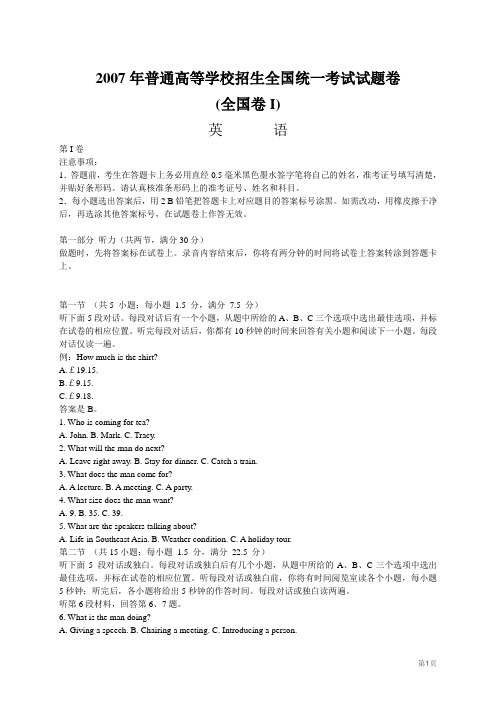
2007年普通高等学校招生全国统一考试试题卷(全国卷I)英语第I卷注意事项:1.答题前,考生在答题卡上务必用直经0.5毫米黑色墨水签字笔将自己的姓名,准考证号填写清楚,并贴好条形码。
请认真核准条形码上的准考证号、姓名和科目。
2.每小题选出答案后,用2 B铅笔把答题卡上对应题目的答案标号涂黑。
如需改动,用橡皮擦干净后,再选涂其他答案标号,在试题卷上作答无效。
第一部分听力(共两节,满分30分)做题时,先将答案标在试卷上。
录音内容结束后,你将有两分钟的时间将试卷上答案转涂到答题卡上。
第一节(共5 小题;每小题 1.5 分,满分7.5 分)听下面5段对话。
每段对话后有一个小题,从题中所给的A、B、C三个选项中选出最佳选项,并标在试卷的相应位置。
听完每段对话后,你都有10秒钟的时间来回答有关小题和阅读下一小题。
每段对话仅读一遍。
例:How much is the shirt?A.£19.15.B.£9.15.C.£9.18.答案是B。
1. Who is coming for tea?A. John.B. Mark.C. Tracy.2. What will the man do next?A. Leave right away.B. Stay for dinner.C. Catch a train.3. What does the man come for?A. A lecture.B. A meeting.C. A party.4. What size does the man want?A. 9.B. 35.C. 39.5. What are the speakers talking about?A. Life in Southeast Asia.B. Weather condition.C. A holiday tour.第二节(共15小题;每小题 1.5 分,满分22.5 分)听下面5 段对话或独白。
(完整word)2007高考英语全国卷II.docx

2007 年普通高等学校招生全国统一考试试题卷(全国卷 II)英语注意事项 :1.本试题卷分第 1 卷 (选择题 ) 和第 II 卷 (非选择题 ) 两部分 , 总分 150 分 , 考试时间120 分钟 . 2.答题前 , 考生须将自己的姓名、准考证号、考场号、座位号填写在本试题卷指定的位置。
3.选择题的每小题选出后,用2B 铅笔将答题卡上对应题目的答案标号涂黑,如需改动,用橡皮擦干净后,再选涂其它答案,不能答在试题卷上。
4.非选择题必须使用0.5 毫米的黑色字迹的签字笔在答题卡上书写,字体工整,笔迹清楚。
5.非选择题必须按照题号顺序在答题卡上各题目的答题区域内作答。
超出答题区域或在其它题的答题区域内书写的答案无效;在草稿纸、本试题卷上答题无效。
6.考试结束,将本试题卷和答题卡一并交回。
第一卷(选择题)第一部分英语知识运用(共三节,满分50 分)第一节语音知识(共5小题;每小题1分,满分5分)从A、B、C、D四个选项中,找出其划线部分与所给单词的划线部分读音相同的选项,并在答题卡上将该项涂黑。
例: haveA. gaveB. saveC. hatD. made1.stopA. loseB. womanC. shockD. rose2.breatheA. thickB. southernC. mathematicsD. method3.groundA. houseB. countryC. groupD. cough4.centerA. oceanB. decideC. causeD. socialist5. animalA. acheB. anythingC. advanceD. anxious第二节语法与词汇知识(共15 小题;每小题 1 分,满分 15 分)从A、B、C、D四个选项中,选出可以填入空白处的最佳选项,并在答题卡将该项涂黑。
例: We ____ last night, but we went to the concert instead.A. must have studiedB. might studyC. should have studiedD. would study答案是C。
2007年高考英语试题(全国卷1)Word版含答案
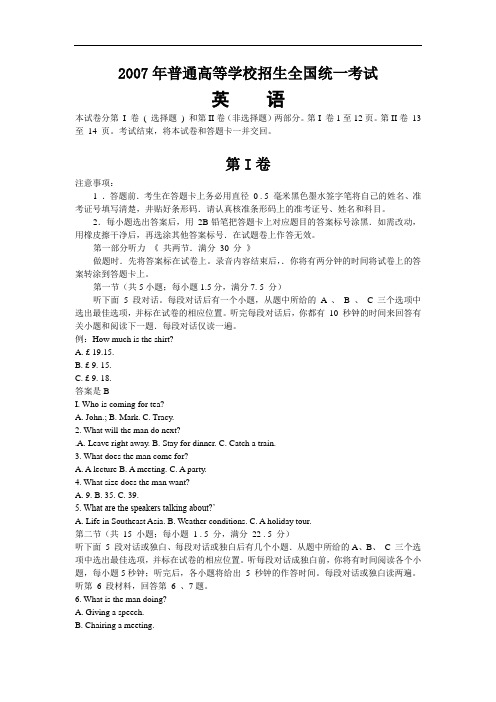
2007年普通高等学校招生全国统一考试英语本试卷分第I 卷( 选择题) 和第II卷(非选择题)两部分。
第I 卷1至12页。
第II卷13 至14 页。
考试结束,将本试卷和答题卡一并交回。
第I卷注意事项:1 .答题前.考生在答题卡上务必用直径0 . 5 毫米黑色墨水签字笔将自己的姓名、准考证号填写清楚,井贴好条形码.请认真核准条形码上的准考证号、姓名和科目。
2.每小题选出答案后,用2B铅笔把答题卡上对应题目的答案标号涂黑.如需改动,用橡皮擦干净后,再选涂其他答案标号.在试题卷上作答无效。
第一部分听力《共两节.满分30 分》做题时.先将答案标在试卷上。
录音内容结束后,.你将有两分钟的时间将试卷上的答案转涂到答题卡上。
第一节(共5小题;每小题1.5分,满分7. 5 分)听下面5 段对话。
每段对话后有一个小题,从题中所给的A 、B 、C三个选项中选出最佳选项,并标在试卷的相应位置。
听完每段对话后,你都有10 秒钟的时间来回答有关小题和阅读下一题.每段对话仅读一遍。
例:How much is the shirt?A. £ 19.15.B. £ 9. 15.C. £ 9. 18.答案是BI. Who is coming for tea?A. John.;B. Mark.C. Tracy.2. What will the man do next?.A. Leave right away. B. Stay for dinner. C. Catch a train.3. What does the man come for?A. A lectureB. A meeting.C. A party.4. What size does the man want?A. 9.B. 35.C. 39.5. What are the speakers talking about?’A. Life in Southeast Asia.B. Weather conditions.C. A holiday tour.第二节(共15 小题;每小题 1 . 5 分,满分22 . 5 分)听下面5 段对话或独白、每段对话或独白后有几个小题.从题中所给的A、B、C 三个选项中选出最佳选项,并标在试卷的相应位置。
2007年高考试题与答案(全国卷1英语)
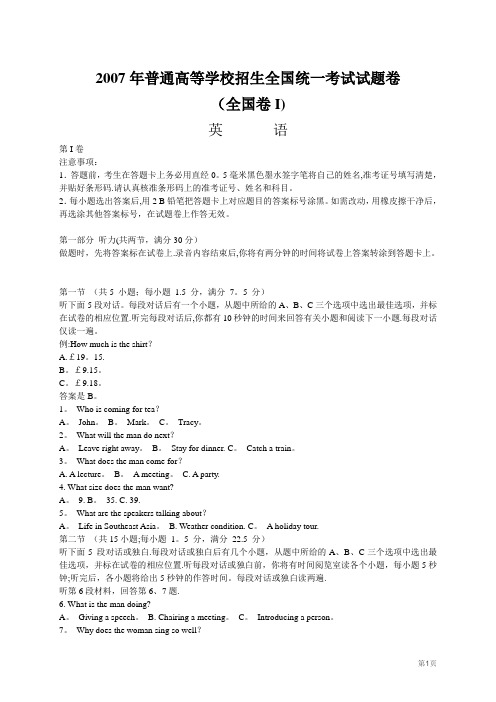
2007年普通高等学校招生全国统一考试试题卷(全国卷I)英语第I卷注意事项:1.答题前,考生在答题卡上务必用直经0。
5毫米黑色墨水签字笔将自己的姓名,准考证号填写清楚,并贴好条形码.请认真核准条形码上的准考证号、姓名和科目。
2.每小题选出答案后,用2 B铅笔把答题卡上对应题目的答案标号涂黑。
如需改动,用橡皮擦干净后,再选涂其他答案标号,在试题卷上作答无效。
第一部分听力(共两节,满分30分)做题时,先将答案标在试卷上.录音内容结束后,你将有两分钟的时间将试卷上答案转涂到答题卡上。
第一节(共5 小题;每小题 1.5 分,满分7。
5 分)听下面5段对话。
每段对话后有一个小题,从题中所给的A、B、C三个选项中选出最佳选项,并标在试卷的相应位置.听完每段对话后,你都有10秒钟的时间来回答有关小题和阅读下一小题.每段对话仅读一遍。
例:How much is the shirt?A.£19。
15.B。
£9.15。
C。
£9.18。
答案是B。
1。
Who is coming for tea?A。
John。
B。
Mark。
C。
Tracy。
2。
What will the man do next?A。
Leave right away。
B。
Stay for dinner. C。
Catch a train。
3。
What does the man come for?A. A lecture。
B。
A meeting。
C. A party.4. What size does the man want?A。
9. B。
35. C. 39.5。
What are the speakers talking about?A。
Life in Southeast Asia。
B. Weather condition. C。
A holiday tour.第二节(共15小题;每小题1。
5 分,满分22.5 分)听下面5 段对话或独白.每段对话或独白后有几个小题,从题中所给的A、B、C三个选项中选出最佳选项,并标在试卷的相应位置.听每段对话或独白前,你将有时间阅览室读各个小题,每小题5秒钟;听完后,各小题将给出5秒钟的作答时间。
2007年高考试题与答案(全国卷1英语)
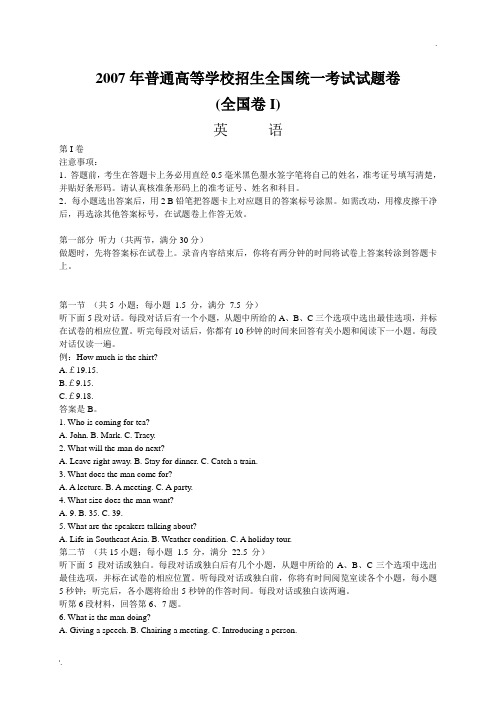
2007年普通高等学校招生全国统一考试试题卷(全国卷I)英语第I卷注意事项:1.答题前,考生在答题卡上务必用直经0.5毫米黑色墨水签字笔将自己的姓名,准考证号填写清楚,并贴好条形码。
请认真核准条形码上的准考证号、姓名和科目。
2.每小题选出答案后,用2 B铅笔把答题卡上对应题目的答案标号涂黑。
如需改动,用橡皮擦干净后,再选涂其他答案标号,在试题卷上作答无效。
第一部分听力(共两节,满分30分)做题时,先将答案标在试卷上。
录音内容结束后,你将有两分钟的时间将试卷上答案转涂到答题卡上。
第一节(共5 小题;每小题 1.5 分,满分7.5 分)听下面5段对话。
每段对话后有一个小题,从题中所给的A、B、C三个选项中选出最佳选项,并标在试卷的相应位置。
听完每段对话后,你都有10秒钟的时间来回答有关小题和阅读下一小题。
每段对话仅读一遍。
例:How much is the shirt?A.£19.15.B.£9.15.C.£9.18.答案是B。
1. Who is coming for tea?A. John.B. Mark.C. Tracy.2. What will the man do next?A. Leave right away.B. Stay for dinner.C. Catch a train.3. What does the man come for?A. A lecture.B. A meeting.C. A party.4. What size does the man want?A. 9.B. 35.C. 39.5. What are the speakers talking about?A. Life in Southeast Asia.B. Weather condition.C. A holiday tour.第二节(共15小题;每小题 1.5 分,满分22.5 分)听下面5 段对话或独白。
2007年普通高等学校招生全国统一考试(全国卷I)英语试卷参考答案
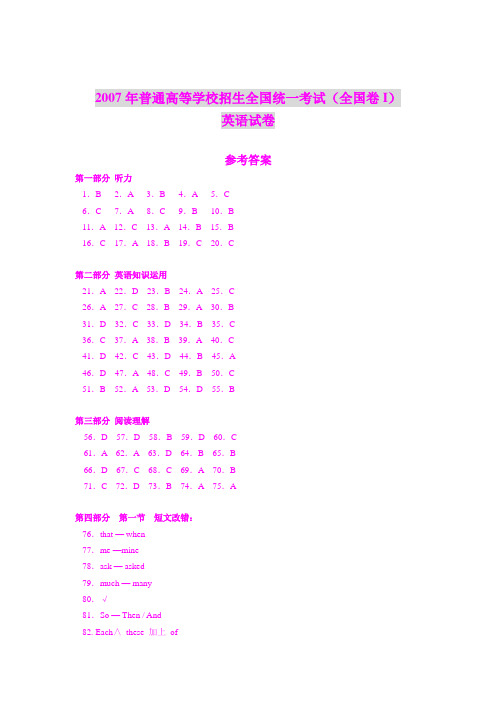
2007年普通高等学校招生全国统一考试(全国卷I)英语试卷参考答案第一部分听力1.B 2.A 3.B 4.A 5.C6.C 7.A 8.C 9.B 10.B11.A 12.C 13.A 14.B 15.B16.C 17.A 18.B 19.C 20.C第二部分英语知识运用21.A 22.D 23.B 24.A 25.C26.A 27.C 28.B 29.A 30.B31.D 32.C 33.D 34.B 35.C36.C 37.A 38.B 39.A 40.C41.D 42.C 43.D 44.B 45.A46.D 47.A 48.C 49.B 50.C51.B 52.A 53.D 54.D 55.B第三部分阅读理解56.D 57.D 58.B 59.D 60.C61.A 62.A 63.D 64.B 65.B66.D 67.C 68.C 69.A 70.B71.C 72.D 73.B 74.A 75.A第四部分第一节短文改错:76.that — when77.me —mine78.ask — asked79.much — many80.√81.So — Then / And82. Each∧these 加上of83.hands — hand84.what — why85.the 去掉参考译文:One possible version:Dear Peter,I’m writing to ask whether you are able to do me a favor.I want to have a pen friend, hopefully a girl in her early twenties, and with interests similar to mine. In my mind, she is someone who is interested in traveling, swimming, and playing table tennis. Besides, it would be better for her to have a pet dog as I have kept one at home for some time. With such a pen friend, I think I can share with her our traveling experiences, taking care of pets, or whatever we have in common. And I believe I will improve my English by doing so and learn more about her country.I look forward to hearing from you soon.Best regards,Li Hua。
2007年春季高考英语
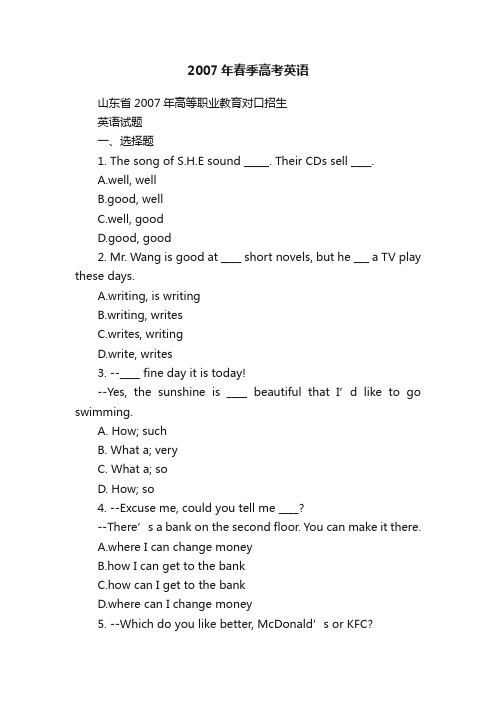
2007年春季高考英语山东省2007年高等职业教育对口招生英语试题一、选择题1. The song of S.H.E sound _____. Their CDs sell ____.A.well, wellB.good, wellC.well, goodD.good, good2. Mr. Wang is good at ____ short novels, but he ___ a TV play these days.A.writing, is writingB.writing, writesC.writes, writingD.write, writes3. --____ fine day it is today!--Yes, the sunshine is ____ beautiful that I’d like to go swimming.A. How; suchB. What a; veryC. What a; soD. How; so4. --Excuse me, could you tell me ____?--There’s a bank on the second floor. You can make it there.A.where I can change moneyB.how I can get to the bankC.how can I get to the bankD.where can I change money5. --Which do you like better, McDonald’s or KFC?--_____, I just like Chinese fast food.A. BothB. AllC. NeitherD. Either6. I don’t feel like _____ the mountain on such a cold day.A.climbingB.to climbC.climbedD.climb7. He advised me ____ TV too long.A.not to watchB.watchingC.not watchD.watched8. --Are you free today?--No, I have ____ to do.A.anything importantB.something importantC.important nothingD.important something9. If he _____ tomorrow, he will be late.A.don’t startB.didn’t startC.doesn’t startD.won’t start10. We are looking forward to ____ the World Cup 2014.A.visitingB.watchingC.lookingD.seeing11. The Spring Festival _____ by Chinese all over the world.A.celebrateB.will celebrateC.is celebratedD.celebrated12. _____ beautiful cards you made!A. What aB. WhatC. HowD. How a13. The _____ you study, the ____ mistakes you will make.A.more careful; fewerB.more careful; lessC.more carefully; fewerD.most carefully; fewer14. No one is ____ Lucy in the class.A.so tallest asB.as taller asC.so high asD.so tall as15. You ought to give up ____.A.in smokingB.smokeC.smokedD.smoking16. --Where is your cat? I haven’t seen it for a long time. --Oh, it ____. It ____ about ten days ago.A.died; is deadB.has died; has diedC.was dead; has diedD.is dead; died17. I spent an hour at the station ____ for the train.A.waitB.waitedC.waitingD.waits18. Usually we don’t realize the importance of nature ____ it is too late.A.unlessB.untilC.ifD.after19. We all remember the days ____ we studied together at school.A.whichB.on thatC.whenD.that20. Tom wanted to have his car ____.A.washB.washedC.washingD.to wash二、填空题1. --_____ do you ____ the animals?--I like them very much.2. --What about your education?--I ____ ____ a vocational school.3. -- ____ can I do for you, madam?--I’m _____ for a coat for my daughter.4. -- ______ _____ do you play basketball? --Once a week.5. --Hello. May I _____ to Mike?--Sorry, he is ____. Please call back later.。
2007年普通高等学校招生全国统一考试英语试卷及答案-全国1

2007年普通高等学校招生全国统一考试第I卷第二部分英语知识运用(共两节.满分45 分)第一节单项填空(共15 小题.每小题l 分.满分15 分)从A、B 、C 、D 四个选项中,选出可以填入空白处的最佳选项.并在答题卡上将该项涂黑。
例:It is generally considered unwise to give a child ________ he or she wants.A. howeverB. whateverC. whicheverD. whenever答案是B21. — Have you heard the latest news?—No, what ______A. is itB. is thereC. are theyD. are those22. Some pre-school children go to a day care center, — they learn simple games and songs.A. thenB. thereC. whileD. where23. The manager suggested an earlier date _______ the meeting.A. onB. forC. aboutD. with24. —It‟s a long time since I saw my sister.—_________ her this weekend‟A. Why not visitB. Why not to visitC. Why not visitingD. Why don‟t visit25. -The last one ____ pays the meal.-Agreed!A. arrived -B. arrivesC. to arriveD. arriving26. 1 won‟t call you, ________ something unexpected happens.A. unlessB. whetherC. becauseD. while27. —How‟s your tour around the North Lake? I s it beautiful?—It_______ be, but it is now heavily polluted.A. willB. wouldC. shouldD. must28. We all know that, _______, the situation will get worse.A. not if dealt carefully withB. if not carefully dealt withC. if dealt not carefully withD. not if carefully dealt with29. 1 smell something ___________ in the kitchen. Can I call you back in a minute?A. burningB. burntC. being burntD. to be burnt30. Does this meal cost $50? I_______something far better than this!A. preferB. expectC. suggestD. suppose31. Between the two generations, It is often not their age, ______their education that causes misunderstanding. -A. likeB. asC. orD. but32. I know a little bit about Italy as my wife and I _________ there several years ago.A. are goingB. had beenC. wentD. have been33. —Can you read the sign, sir? No smoking allowed in the lift!A. Never mindB. Don‟t mention itC. Sure, I don‟t smokeD. Pardon me34. “Goodbye, then,” she said, without even ________ from her book.A. looking downB. looking upC. looking awayD. looking on35. The flowers were so lovely that they _________ in no time.A. soldB. had been soldC. were sold P. would sell第二节完形填空(共20 小题;共20小题,每小题1 . 5 分.满分30 分)阅读下面短文,从短文后各题所给的四个选项(A、B、 C 和 D )中,选出可以填入空白处的最佳选项,并在答题卡上将该项涂黑。
2007年上海市普通高等学校春季招生考试英语试卷

2007年上海市普通高等学校春季招生考试英语试卷Ⅲ.ClozeDirections:For each blank in the following passages there are four words or phrases marked A, B, C and D. Fill in each blank with the word orphrase that best fits the context.(A)How can we explain the popularity of neckties? For years, fashion historians have predicted that men would 45 wearing ties because they seemed to have little or no function. It may be the men to them because ties As long as world and business. leaders continue to wear ties, the young businessmen will 46 them and ties will remain popular. 47 , neckties do have a different kind of appeal. Neckties cover the buttons of the shirt and emphasize the length of a man’s body. They also 48 color and adornment (装饰)to men’s clothing, which is often plain and serious. Today, there are tens of thousands’ of designs of ties 49 . There are ties for special 50 for Valentine’s Day, fireworks for the Fourth of July, and Santa Claus for Christmas. There are ties that tell you about a man’s51 pictures of tennis rackets, motorcycles, airplanes, fishing rods, or musical instruments, to name a few. There are even ties for different occupations such as accountants, firefighters, and police officers. And 52 ties are becoming ever more popular. You can get ties covered withcolorful frogs and bottles of beer. 53 you enjoy rock music, you caneven find a tie in the shape of a guitar!Funny or formal, wide or narrow, it’s 54 that ties are going to be aroundfor a long time.B. mindC. forgetD. stopB. trustC. followD. admireB. ThereforeC. InsteadD. HoweverB. changeC. exposeD. deliverB. availableC. alternativeD. collectiveB. ceremoniesC. occasionsD. peopleB. imagesC. possessionsD. hobbiesB. funnyC. plainD. traditionalB. BecauseC. UnlessD. Though(B)Homework is work, not play. In contrast to what some might hope, students 55 finish their homework exclaiming that they had great fun. Nor is homework an activity that students choose to undertake. It is 56 by a teacher for students to complete on the teacher’s schedule, with the teacher’s requirements in mind. So to have the fight 57 Will be of great help. Homework means business and the student should expect to work on it seriously. As in the workplace, careless efforts and lack of self-discipline are likely to make the 58 impression.Teachers assign homework for 59 purposes. In some cases, teachers seek to review and solidify material being covered in class; homework is also designed to 60 student learning beyond class lessons. As students mature, teachers often assign homework nightly in several subjects. Homework is also used to prepare students to handle new work, 61 in the ease of summer reading. Increasingly, school reforms call for homework to take the form of course projects, thus increasing its 62 to “real-life”job-related activity.Like jobs, homework can be appealing when its resources are well managed. Resources 63 sources of information,textbooks, of course, and increasingly, the Internet but they also include a quiet space to work, materials and equipment such as calculators, paper or a computer, and others who cohabit (共面存在) in the homework environment. The external (外部的) resources needed for homework can be viewed as a kind of 64 . office for the child with features like those needed in theworkplace.B. oftenC. mostlyD. rarelyB. forcedC. assignedD. taughtB. answerC. scheduleD. attitudeB. vividC. wrongD. vagueB. variousC. ordinaryD. temporaryB. describeC. displayD. rewardB. whenC. even ifD. now thatB. solutionC. approachD. connectionB. includeC. reserveD. resembleB. businessC. headD. supplyⅣ.Reading ComprehensionDirections: Read the following four passages. Each passage is followed by several questions or unfinished statements. For each of them there are four choices marked A, B, C and D .Choose the one that fits best according to the information given in the passage you have just read.(A)Saturday 28 April, 2001: Dennis Tito was setting off on his holiday. Mr Tito’s journey was certainly unusual! So was the transport he chose, and the price of his trip. The 60 year-old multi-millionaire from New York was sitting on board a Russian spaceship. He was on a journey to the International Space Station. It might have been a routine trip for the two astronauts who were traveling with him, but for him it was certainly no ordinary journey. Dennis Tito was the first tourist ever in space, and he had paid the sum of $20 million to go there. As the spacecraft left the earth’s atmosphere, Tito drank a glass of fruit juice to celebrate and looked down at the earth’s blue-green surface. Two minutes later, he was sick. Luckily it was only a minor problem. He soon recovered, and fromthen on enjoyed a smooth journey. When he arrived at the space station, there was a big smile on his face. “A great trip!” he commented. “I lovespace.”For a long time space travel was something for heroes. But all this is going to change. Companies like ProSpace are investing large amounts of money in space travel. They want space and space travel to belong to the public, not just governments. There are other plans, like voyages through space from one side of the world to the other. Maybe we will be a ble to depart from New York at nine o’clock in the morning, and arrivean hour later--- in Tokyo! Such a schedule would allow the business traveler to return to New York on the same day, and still have eight hoursfor a meeting!65. Which of the following might be the best title of the passage?A. Business TravelersB. Space TouristsC.A Space ExplorationD.A FrighteningAdventure66. According to the passage, Dennis Tito .A. enjoyed his trip very muchB. was too sick toeat anything in spaceC. suffered a lot during the tripD. didn’t thinkthe trip was worthwhile67.Which of the following statements is tree according to the passage?A. Tito was the first American tourist in space.B. Tito contributed all of his wealth to his space trip.C. Tito visited the Russian Space Station during his trip.D. Space travel has become a routine for Tito since then.68.It can be expected from the passage that .A. space travel will belong to the public instead of governmentsB. airplanes will some day reach the speed of space vehiclesC. will be able to circle the earth within less than an hourD. travel between two places on earth will be made through spaceBHIGHFIELD COMPREHENSIVE SCHOOLSCHOOL REPORTForm Teacher: G.Baker Pupil’s Name: Simon WatkinsTerm: Summer 2005 Form:Ⅳ BSubject Exam Classwork CommentsEnglish 59 61 Simon has reached a satisfactory standard but now needs to apply himself with more determination. Mathematics 77 85 Sound work and progress throughout the year. Welldone!History 46 53 A disappointing exam result. He is unable to giveattentionto this subject for long.Chemistry 78 85 His obvious ability in the subject was not fullyreflected in his exam work, but I have high hopes for him nevertheless. Physics 86 94 An excellent term’s performance. He goes from strength tostrength. A born scientist, I feel.Biology 57 60 This time next year he will be taking the “0” exam. He needs to concentrate on the work, not on class conversation. French 41 46 Clearly he didn’t bother to revise. His general attitude is fartoo casual.PhysicalEducation / 31 Weak. It’s time he exercised his body more and his voice less. He should try to work with a team.FORM TEACHER’S REMARKSBasically satisfactory work and progress though he will now have realized, I hope, that in certain subject areas he needs to make speedyimprovement. HEADMASTERI shall be keeping an eye on his progress in his weaker subjects thoughhis success in the sciences is most pleasing.69.According to the comments of the Physical Education teacher,Simon .A. is too talkative in the classB. likes to work with his classmatesC. doesn’t exercise his body at the fight timeD. becomes weak because he doesn’t exercise at all70.Which of Simon’s subjects will attract the headmaster’s attention infuture?A .Biology and Maths. B. History andFrench.C. English and Chemistry.D. Physics andPhysical Education.71.Which of the following statements best describes Simon?A. He has made great progress in language classes.B. His potential has been fully reflected in science classes.C. His grade in maths makes him a born scientist.D. He needs to improve his attitude on certain subjects.(C)Making fists is relaxing. It dictates the shape of the immediate future; it calms you down (it’s OK, it’s on a list somewhere) and it makes you feel good when you cross something off 0ist-making is standard practice in therapy for depression). It might even help you to get things done too. The more you have to do, the more you need a list and few people with high-powered jobs get by without them. Women always think they’re better at lists than men. Men tend to have Tasks which theyassemble ’into Action Plans whereas women just have lists of Things ToDo.James Oliver, psycholo gist, has created his own “time management matrix (模式)”. He writes a list of things to do and then organizes them into categories: things that have to be done straight away, other things that it would be good to do today, things that are important but have n’t got to be done immediately and things that are less urgent but that he doesn’t want to forget. “Using categories to order the world is the way the human mind works,” he says. “After that, you should divide things into levels of importance.” But he also warns, “If people get too absorbed in making fists, it doesn’t work. They have too many categories and lose their ability to decide which is the most important.”It’s all a question of what works best for you, whether it’s a tidy notebook, a packet of Post-it notes or the back of your hand. Having tried all these, student Kate Rollins relies on a computerized list, which is printed out each morning. “My electronic organizer has changed my life,” she says. “Up to now, I’ve always relied on my good memory, but now that I’m working and studying, I find I’ve got too much to keep in my head.”So what are you waiting for? No, you’re not too busy to make today the first day of your upgraded time-managed life. In fact, there’s no better time titan the present to begin to take increased control of your work and life. So, get out your pencil and pen and make a list.72.The main purpose of making lists is to .A. help map out one’s futureB. divide things intolevels of importanceC. treat certain diseases such as depressionD. organise one’swork and life reasonably73.We can learn from the passage that .A. good memory helps in list makingB. too much’ listing might be misleadingC. women usually make a lot more lists than menD. people with high-powered jobs make lists most74.The word “categories” in paragraph 2 most probably has the samemeaning as“”.A. groupsB. portionsC. itemsD. areas75.In this passage the author intends to .A. suggest a way of raising one’s living standardB. introduce some ways of business managementC. urge people to develop the habit of listingD. warn people not to rely on their memory(D)“Racism (种族歧视) is a grown-up disease,” declares the sa ying on Ruby Bridge’s website along with a photo of Mrs Bridge today, a 6-year-oldgirl four decades ago. In the photo, she is walking up the steps of the W’filiam Frantz Public School in New Orleans, a little black girlaccompanied by two officers who protect her on her way to school. Her name then was Ruby Nell. It was Nov. 14, 1960. She was the first black child to enroll at this all-white elementary school according to the court order to desegregate in New Orleans schools. Her story is moving -- she was a very courageous child -- and remains a significant proof against intolerance (不宽容) of all kinds. Ruby’s photo brings out another powerful image on her website: Norman Rockwelrs symbolic painting for Look magazine on Jan. 14, 1964, “The Problem We All Live With.”Rockwell was an illustrator of exceptional skill and charm. He produced a vast number of unforgettable images over a long career, many of them involving children. His American kids are innocent and appealing, but often, at the same time, decidedly naughty. His method was to photograph his models, and the resulting paintings were photographic. But it is revealing to see how the artist slightly changed facial expressions from photo to oil painting in order to make his paintings communicate with the viewer. Communication, even persuasion, lay at the back of hiswork; this was art for effect.“The Problem We All Live With” belongs to Rockwell’s later work, when he began openly showing his strong belief in liberty. This is a highly persuasive image. Before he arrived at the final copy, one sketch(草图) shows the little girl closer to the two officers following her than to those in front. In the finished picture, the girl seems more determined, independent, and untouched. The unfriendly tomatoes thrown on the wall are behind her now and she is completely unaffected.76. Ruby Nell was protected by officers on her way to school,because .A. she was a little fighter against racismB. she was very young, short and timidC. she was the first black to study at all-white schoolD. she was chosen by the complete white children77.According to the passage, “The Problem We All Live With” is a(n)A. social program for American childrenB. famous painting by Norman RockwellC. photo displayed on Ruby Bridges’ websit eD. exhibition at the Norman Rockwell Museum78.The word “desegregate” in paragraph 2 probably means“”.A. fight against the whiteB. end racialseparationC. struggle for freedom D .stop theblack-white conflict79.The main topic of this passage is .A. how Rockwell encouraged Ruby to fight against racismB. how Ruby won her fight to go to an all-white schoolC. how Rockwell expressed his protest in .Iris workD. how persuasive Rockwell’s earlier work of art is(E)Directions: Read the following text and choose the most suitable heading from A-F for each paragraph. There is one extra heading whichyou do not need.A. Ways to beautify eyesB. Proper use of eye contactC. Techniques of sending eye signalsD. Colours of people’s eyesE. Functions of different parts of the eyeF. Variety of messages conveyed through eyes80.The coloured part of the eye is called the lens. There are three basic eye colours-brown, blue and green. A few albino people have red or pink eyes, but these are very rare. Many people believe that blue eyes are more delicate than brown eyes. In fact they are just as tough as brown eyes,although they. are more sensitive to light.81.We only see’part of the eyeball, although the whole eye is as big as a table tennis ball. Light. enters the eye through the pupil and passes through the lens. The lens focuses the light onto the retina at the back of the eye. The retina sends the signal to the brain along the optic nerve. The image on the retina is actually upside-down, but the brain corrects it. As we get older our eyesight becomes worse. This happens because the lens isn’t as flexible as when we are young and the eye musc les are weaker.82.Our eyes are the most important of our five senses. We receive 80% of our information about the world through our eyes. We also send signals to other people with our eyes. Some eye signals are unconscious. When we look at something nice, our pupils get bigger. But when we don’t like something, they become smaller. We cry when we are unhappy and sometimes when we are very happy. But we can also control some eye signals. For example, we can wink at someone or raise an eyebrow. Sunglasses make someone appear mysterious or dangerous, because they hide that eyes and so we can’t see the signals.83.We find large eyes more attractive. Children have large eyes in proportion to their heads. Cartoon characters always have large eyes, too. We can’t actually change our eyes, but we can make them look bigger with make-up. Eye make-up isn’t new. Pictures in the Pyramids show thatthe ancient Egyptians both men and women-used it. False eyelashes can make eyelashes longer. Eye shadow on the eyelids can make the eyes look bigger and more dramatic. Glasses can also make eyes look bigger.84.We do not normally look into someone’s eyes for long, especially when they are very close. Eye contact can be very threatening, so people only do it when they want to threaten someone. It is also very intimate. This is why lovers gaze into each other’s eyes. It’s also why people don’t look ateach other in lifts.Ⅰ.TranslationDirections: Translate the following sentences into English, using thewords given in the brackets.1.前天我们订购了二十台洗衣机(order)2.因为大雨,校运会将不得不推迟(put off)3.为了您的家庭幸福,务必遵守交能规则。
2007年高考试题与答案(全国卷1英语)
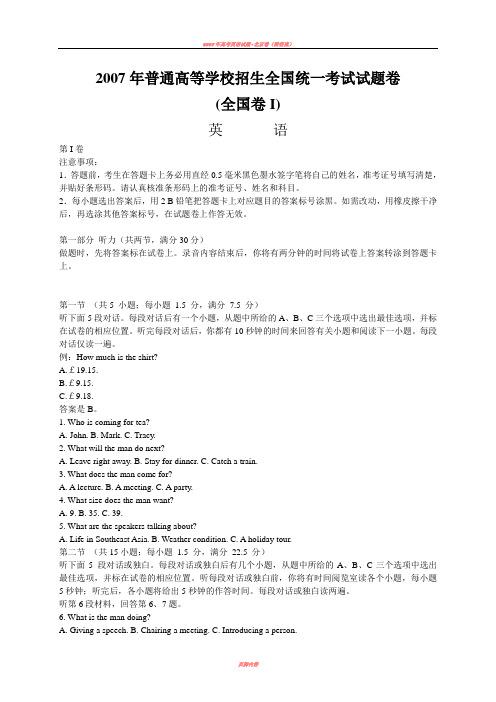
2007年普通高等学校招生全国统一考试试题卷(全国卷I)英语第I卷注意事项:1.答题前,考生在答题卡上务必用直经0.5毫米黑色墨水签字笔将自己的姓名,准考证号填写清楚,并贴好条形码。
请认真核准条形码上的准考证号、姓名和科目。
2.每小题选出答案后,用2 B铅笔把答题卡上对应题目的答案标号涂黑。
如需改动,用橡皮擦干净后,再选涂其他答案标号,在试题卷上作答无效。
第一部分听力(共两节,满分30分)做题时,先将答案标在试卷上。
录音内容结束后,你将有两分钟的时间将试卷上答案转涂到答题卡上。
第一节(共5 小题;每小题 1.5 分,满分7.5 分)听下面5段对话。
每段对话后有一个小题,从题中所给的A、B、C三个选项中选出最佳选项,并标在试卷的相应位置。
听完每段对话后,你都有10秒钟的时间来回答有关小题和阅读下一小题。
每段对话仅读一遍。
例:How much is the shirt?A.£19.15.B.£9.15.C.£9.18.答案是B。
1. Who is coming for tea?A. John.B. Mark.C. Tracy.2. What will the man do next?A. Leave right away.B. Stay for dinner.C. Catch a train.3. What does the man come for?A. A lecture.B. A meeting.C. A party.4. What size does the man want?A. 9.B. 35.C. 39.5. What are the speakers talking about?A. Life in Southeast Asia.B. Weather condition.C. A holiday tour.第二节(共15小题;每小题 1.5 分,满分22.5 分)听下面5 段对话或独白。
2007年高考英语答案详解

2007年普通高等学校招生全国统一考试英语答案详解单项选择:21. A. news是不可数名词,故用it替代22. D. where引导的定语从句23. B. 为…..约定日期24. A. why not do sth.为一固定句形25. C. 当名词前有last、only、虚数词或最高级等词修饰时,通常用不定式做定语26. A. unless表示“除非、如果不是”。
根据意思可得27. C. should在此表“惋惜”的口吻。
此题难度较大,区分度较低。
28. B. if not相当于unless,也是if it is not carefully dealt with省略说法29. A. 宾补结构,sth.与burn是主谓关系,故用smell sth burning30. C前面的语境很重要,说话者认为50元花的不值,所以这里expect表示“期望、指望”,意思是:我期望50元能买到比这好得多的东西。
此题难度较大。
31. D. not…..but结构32. C. 时态判断,后面有表示过去的时间状语several years ago.33. D. 根据语境,是在向别人道歉34. C. 根据意思,她说话时连头都没有抬35. C. 被动语态和时态的结合题,根据前面提示,应该是一般过去时完形填空:36. C 解析:happen 意为“发生”,happen to do sth.意为“碰巧做某事”,根据see的宾语“20eggs laid by a wild goose”可判断出在湖边散步时碰巧看见20个天鹅下的蛋。
manage意为“办理,处置,处理;支配,管理;经营”;manage to do sth.意为“设法做成功某事”;attempt意为“试,企图”;suppose意为“设想,推测;猜想某事(某人)如何”。
37. A 解析:realize 意为“认识到”,表示过了一段时间,这个女孩意识到天鹅妈妈不会回来找它的蛋。
2007年全国高考英语全国卷1
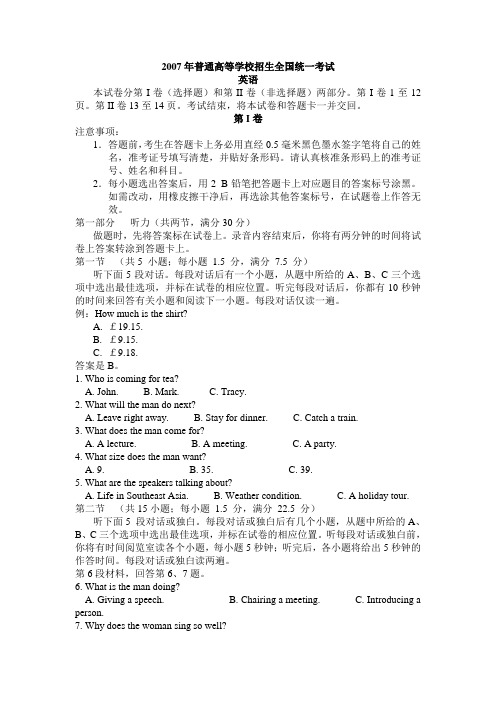
2007年普通高等学校招生全国统一考试英语本试卷分第I卷(选择题)和第II卷(非选择题)两部分。
第I卷1至12页。
第II卷13至14页。
考试结束,将本试卷和答题卡一并交回。
第I卷注意事项:1.答题前,考生在答题卡上务必用直经0.5毫米黑色墨水签字笔将自己的姓名,准考证号填写清楚,并贴好条形码。
请认真核准条形码上的准考证号、姓名和科目。
2.每小题选出答案后,用2 B铅笔把答题卡上对应题目的答案标号涂黑。
如需改动,用橡皮擦干净后,再选涂其他答案标号,在试题卷上作答无效。
第一部分听力(共两节,满分30分)做题时,先将答案标在试卷上。
录音内容结束后,你将有两分钟的时间将试卷上答案转涂到答题卡上。
第一节(共5 小题;每小题 1.5 分,满分7.5 分)听下面5段对话。
每段对话后有一个小题,从题中所给的A、B、C三个选项中选出最佳选项,并标在试卷的相应位置。
听完每段对话后,你都有10秒钟的时间来回答有关小题和阅读下一小题。
每段对话仅读一遍。
例:How much is the shirt?A.£19.15.B.£9.15.C.£9.18.答案是B。
1. Who is coming for tea?A. John.B. Mark.C. Tracy.2. What will the man do next?A. Leave right away.B. Stay for dinner.C. Catch a train.3. What does the man come for?A. A lecture.B. A meeting.C. A party.4. What size does the man want?A. 9.B. 35.C. 39.5. What are the speakers talking about?A. Life in Southeast Asia.B. Weather condition.C. A holiday tour.第二节(共15小题;每小题 1.5 分,满分22.5 分)听下面5 段对话或独白。
2007年高考试题与答案(全国卷1英语)
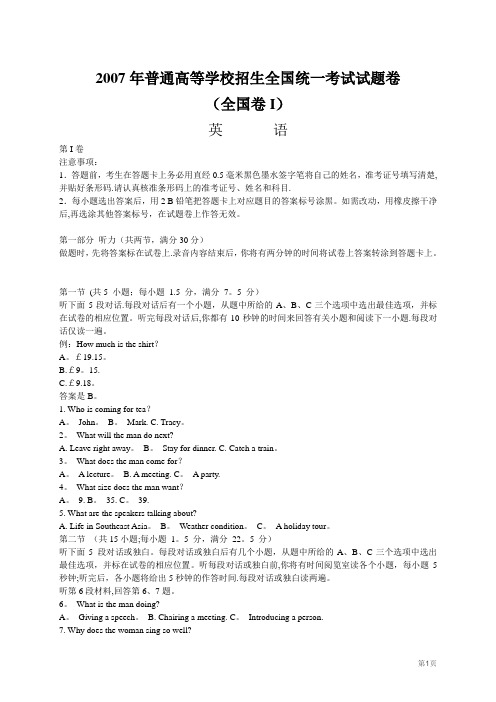
2007年普通高等学校招生全国统一考试试题卷(全国卷I)英语第I卷注意事项:1.答题前,考生在答题卡上务必用直经0.5毫米黑色墨水签字笔将自己的姓名,准考证号填写清楚,并贴好条形码.请认真核准条形码上的准考证号、姓名和科目.2.每小题选出答案后,用2 B铅笔把答题卡上对应题目的答案标号涂黑。
如需改动,用橡皮擦干净后,再选涂其他答案标号,在试题卷上作答无效。
第一部分听力(共两节,满分30分)做题时,先将答案标在试卷上.录音内容结束后,你将有两分钟的时间将试卷上答案转涂到答题卡上。
第一节(共5 小题;每小题 1.5 分,满分7。
5 分)听下面5段对话.每段对话后有一个小题,从题中所给的A、B、C三个选项中选出最佳选项,并标在试卷的相应位置。
听完每段对话后,你都有10秒钟的时间来回答有关小题和阅读下一小题.每段对话仅读一遍。
例:How much is the shirt?A。
£19.15。
B.£9。
15.C.£9.18。
答案是B。
1. Who is coming for tea?A。
John。
B。
Mark. C. Tracy。
2。
What will the man do next?A. Leave right away。
B。
Stay for dinner. C. Catch a train。
3。
What does the man come for?A。
A lecture。
B. A meeting. C。
A party.4。
What size does the man want?A。
9. B。
35. C。
39.5. What are the speakers talking about?A. Life in Southeast Asia。
B。
Weather condition。
C。
A holiday tour。
第二节(共15小题;每小题1。
5 分,满分22。
5 分)听下面5 段对话或独白。
每段对话或独白后有几个小题,从题中所给的A、B、C三个选项中选出最佳选项,并标在试卷的相应位置。
2007年高考试题——英语(全国卷1)打印
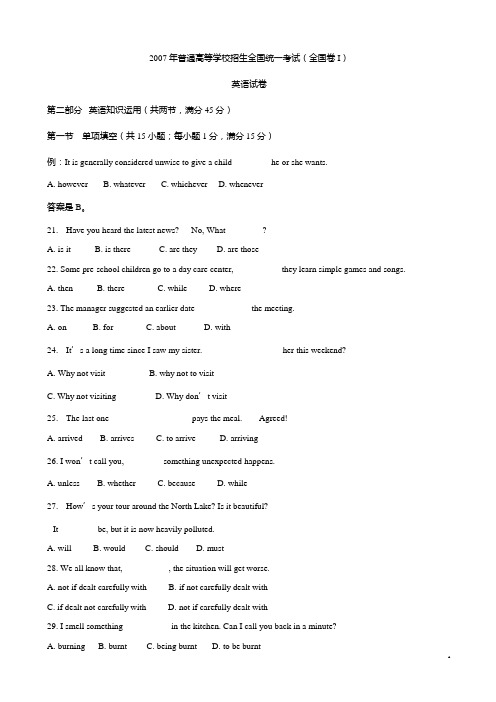
2007年普通高等学校招生全国统一考试(全国卷I)英语试卷第二部分英语知识运用(共两节,满分45分)第一节单项填空(共15小题;每小题1分,满分15分)例:It is generally considered unwise to give a child ________ he or she wants.A. howeverB. whateverC. whicheverD. whenever答案是B。
21. --Have you heard the latest news? --No, What ________?A. is itB. is thereC. are theyD. are those22. Some pre-school children go to a day care center, __________ they learn simple games and songs.A. thenB. thereC. whileD. where23. The manager suggested an earlier date ____________ the meeting.A. onB. forC. aboutD. with24. --It’s a long time since I saw my sister. --_______________ her this weekend?A. Why not visitB. why not to visitC. Why not visitingD. Why don’t visit25. --The last one __________________ pays the meal. --Agreed!A. arrivedB. arrivesC. to arriveD. arriving26. I won’t call you, ________ something unexpected happens.A. unlessB. whetherC. becauseD. while27. --How’s your tour around the North Lake? Is it beautiful?--It ________ be, but it is now heavily polluted.A. willB. wouldC. shouldD. must28. We all know that, __________, the situation will get worse.A. not if dealt carefully withB. if not carefully dealt withC. if dealt not carefully withD. not if carefully dealt with29. I smell something __________ in the kitchen. Can I call you back in a minute?A. burningB. burntC. being burntD. to be burnt30. Does this meal cost $50? I __________ something far better than this!A. preferB. expectC. suggestD. suppose31. Between the two generations, it is often not their age, _________ their education that causes misunderstanding.A. likeB. asC. orD. but32. I know a little bit about Italy as my wife and I ________ there several years ago.A. are goingB. had beenC. wentD. have been33. --Can you read the sign, sir? No smoking allowed in the lift! --__________________.A. Never mindB. Don’t mention itC. Sure, I don’t smokeD. Pardon me34. “Goodbye, then,”she said, without even ___________ from her book.A. looking downB. looking upC. looking awayD. looking on35. The flowers were so lovely that they __________ in no time.A. soldB. had been soldC. were soldD. would sell第二节完型填空(共20小题;每小题1.5 分,满分30 分)阅读下面短文,从短文后各题所给的四个选项(A、B、C和D)中,选出可以填入空白处的最佳选项,并在答题卡上将该项涂黑。
2007年普通高等学校招生全国统一考试英语试卷及答案-全国2

2007年普通高等学校招生统一考试(全国卷II)英语第1卷第一部分英语知识运用(共三节,满分50分)第一节语音知识(共5小题,每小题1分,满分5分)从A、B、C、D四个选项中,找出其划线部分与所给单词的划线部分读音相同的选项,在答题卡上将该项涂黑。
例:haveA. gaveB. saveC. hatD. made答案是C.1. stop A. lose B. woman C. shock D. rose2. breathe A. thick B. southern C. mathematics D. method3. ground A. house B. country C. group D. cough4. center A. ocean B. decide C. cause D. socialist5. animal A. ache B. anything C. advance D. anxious 第二节语法和词汇知识(共15小题,每小题1分,满分15分)从A、B、C、D四个选项中,选出可以填入空白处的最佳选项,并在答题卡上将该项涂黑。
6. — We have booked a room for today and tomorrow. _______, sir.A. I'm sureB. My pleasureC.It's all rightD. I'll check7. _______ felt funny watching myself on TV.A. OneB. ThisC.ItD. That8. _______ he had not hurt his leg, John would have won the race.A. IfB. SinceC.ThoughD. When9. After two years' research, we now have a _______ better understanding of the disease.A. veryB. farC.fairlyD. quite10. Speaking of all the songs he has written, I think this is probably his _______ one.A. better-knownB. well-knownC.best-knownD. most-known11. If Joe' s wife won' t go to the party, _______.A. he will eitherB. neither will heC.he neither willD. either he will12. At the beginning of class, the noise of desks _______could be heard outside the classroom.A. opened and closedB. to be opened and closedC.being opened andclosed D. to open and close13.1 have _______ all my papers but I still can't find my notes.A. looked throughB. looked forC.looked afterD. looked out14. -I'm sony to have kept you waiting.- _______, Bill.A. You' re welcomeB. Go aheadC.Don't mention itD. No problem15. — Is there anything wrong. Bob? You look sad.---Oh, nothing much. In fact, I ______ of my friends back home.A. have just thoughtB. was just thinkingC.would just thinkD. will just be thinking16. Some people choose jobs for other reasons _______ money these days.A. forB. exceptC.besidesD. with17. _______ matters most in learning English is enough practice.A. WhatB. WhyC.WhereD. Which18. Why don't you just _______ your own business and leave me alone?A. makeB. openC.considerD. mind19. - Could you tell me the way to _______ Johnsons, please?- Sorry, we don' t have _______ Johnson here in the village.A. the; theB. the; a C不填; theD. the; 不填20. - Tom, you didn't come to the party last night?- I _______, but I suddenly remembered I had homework to do.A. had toB. didn'tC.was going -toD. wouldn' t第三节完形填空(共20小题,每小题1.5分,满分30分)阅读下面短文,从短文后个体所给的四个选项(A、B、C、D)中,选出可以填入空白处的最佳选项,并在答题卡上将该项涂黑。
2007年普通高等学校招生全国统一考试(全国卷II) 英语试卷
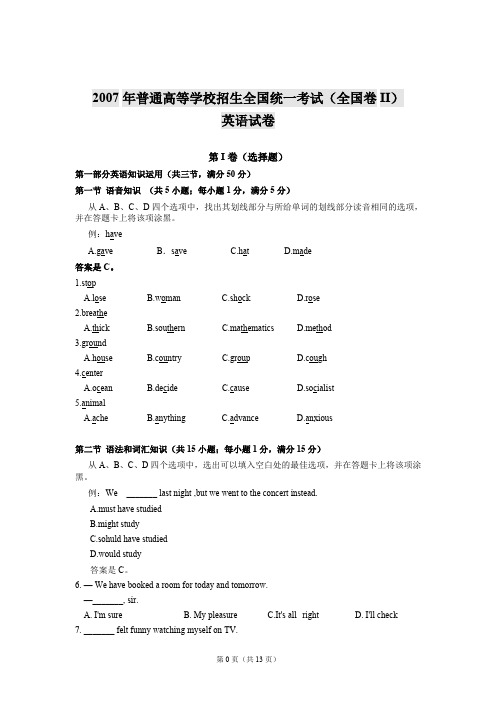
2007年普通高等学校招生全国统一考试(全国卷II)英语试卷第I卷(选择题)第一部分英语知识运用(共三节,满分50分)第一节语音知识(共5小题;每小题1分,满分5分)从A、B、C、D四个选项中,找出其划线部分与所给单词的划线部分读音相同的选项,并在答题卡上将该项涂黑。
例:haveA.gave B.save C.hat D.made答案是C。
1.stopA.loseB.womanC.shockD.rose2.breatheA.thickB.southernC.mathematicsD.method3.groundA.houseB.countryC.groupD.cough4.centerA.oceanB.decideC.causeD.socialist5.animalA.acheB.anythingC.advanceD.anxious第二节语法和词汇知识(共15小题;每小题1分,满分15分)从A、B、C、D四个选项中,选出可以填入空白处的最佳选项,并在答题卡上将该项涂黑。
例:We _______ last night ,but we went to the concert instead.A.must have studiedB.might studyC.sohuld have studiedD.would study答案是C。
6. — We have booked a room for today and tomorrow.—_______, sir.A. I'm sureB. My pleasureC.It's all rightD. I'll check7. _______ felt funny watching myself on TV.A. OneB. ThisC.ItD. That8. _______ he had not hurt his leg, John would have won the race.A. IfB. SinceC.ThoughD. When9. After two years' research, we now have a _______ better understanding of the disease.A. veryB. farC.fairlyD. quite10. Speaking of all the songs he has written, I think this is probably his _______ one.A. better-knownB. well-knownC.best-knownD. most-known11. If Joe' s wife won' t go to the party, _______.A. he will eitherB. neither will heC.he neither willD. either he will12. At the beginning of class, the noise of desks _______could be heard outside the classroom.A. opened and closedB. to be opened and closedC.being opened and closedD. to open and close13.1 have _______ all my papers but I still can't find my notes.A. looked throughB. looked forC.looked afterD. looked out14. —I'm sony to have kept you waiting.— _______, Bill.A. You' re welcomeB. Go aheadC.Don't mention itD. No problem15. — Is there anything wrong. Bob? You look sad.—Oh, nothing much. In fact, I ______ of my friends back home.A. have just thoughtB. was just thinkingC.would just thinkD. will just be thinking16. Some people choose jobs for other reasons _______ money these days.A. forB. exceptC.besidesD. with17. _______ matters most in learning English is enough practice.A. WhatB. WhyC.WhereD. Which18. Why don't you just _______ your own business and leave me alone?A. makeB. openC.considerD. mind19. — Could you tell me the way to _______ Johnsons, please?—Sorry, we don' t have _______ Johnson here in the village.A. the; theB. the; a C不填; the D. the; 不填20. —Tom, you didn't come to the party last night?—I _______, but I suddenly remembered I had homework to do.A. had toB. didn'tC.was going -toD. wouldn' t第三节完形填空(共20小题;每小题1.5分,满分30分)阅读下面短文,从短文后各题所给的四个选项(A、B、C和D)中,选出可以填入空白处的最佳选项,并在答题卡上将选项涂黑。
(完整word)2007高考英语全国卷II
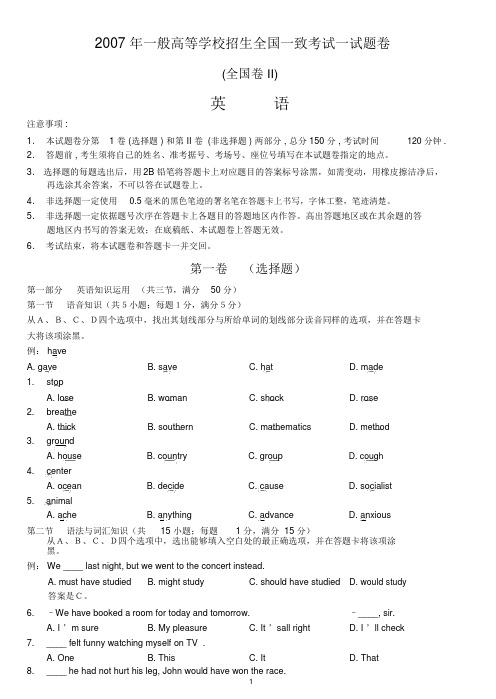
2007 年一般高等学校招生全国一致考试一试题卷(全国卷 II)英语注意事项 :1.本试题卷分第 1 卷 (选择题 ) 和第 II 卷 (非选择题 ) 两部分 , 总分 150 分 , 考试时间120 分钟 . 2.答题前 , 考生须将自己的姓名、准考据号、考场号、座位号填写在本试题卷指定的地点。
3.选择题的每题选出后,用2B 铅笔将答题卡上对应题目的答案标号涂黑,如需变动,用橡皮擦洁净后,再选涂其余答案,不可以答在试题卷上。
4.非选择题一定使用0.5 毫米的黑色笔迹的署名笔在答题卡上书写,字体工整,笔迹清楚。
5.非选择题一定依据题号次序在答题卡上各题目的答题地区内作答。
高出答题地区或在其余题的答题地区内书写的答案无效;在底稿纸、本试题卷上答题无效。
6.考试结束,将本试题卷和答题卡一并交回。
第一卷(选择题)第一部分英语知识运用(共三节,满分50 分)第一节语音知识(共5小题;每题1分,满分5分)从A、B、C、D四个选项中,找出其划线部分与所给单词的划线部分读音同样的选项,并在答题卡大将该项涂黑。
例: haveA. gaveB. saveC. hatD. made1.stopA. loseB. womanC. shockD. rose2.breatheA. thickB. southernC. mathematicsD. method3.groundA. houseB. countryC. groupD. cough4.centerA. oceanB. decideC. causeD. socialist5. animalA. acheB. anythingC. advanceD. anxious第二节语法与词汇知识(共15 小题;每题 1 分,满分 15 分)从A、B、C、D四个选项中,选出能够填入空白处的最正确选项,并在答题卡将该项涂黑。
例: We ____ last night, but we went to the concert instead.A. must have studiedB. might studyC. should have studiedD. would study答案是C。
(完整word)2007高考英语全国卷II
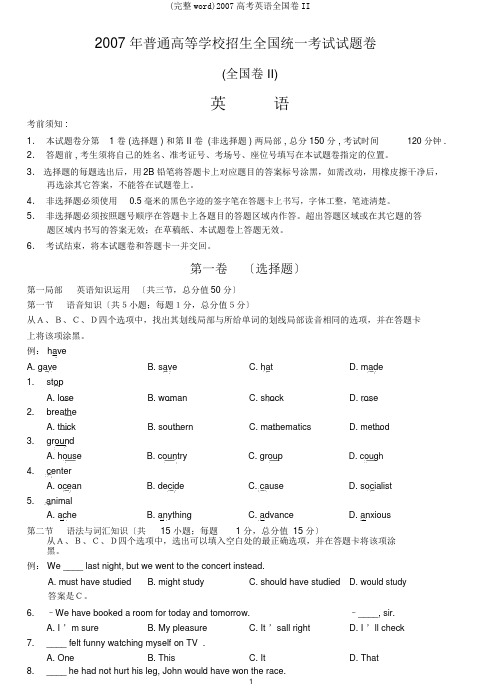
2007 年普通高等学校招生全国统一考试试题卷(全国卷 II)英语考前须知 :1.本试题卷分第 1 卷 (选择题 ) 和第 II 卷 (非选择题 ) 两局部 , 总分 150 分 , 考试时间120 分钟 . 2.答题前 , 考生须将自己的姓名、准考证号、考场号、座位号填写在本试题卷指定的位置。
3.选择题的每题选出后,用2B 铅笔将答题卡上对应题目的答案标号涂黑,如需改动,用橡皮擦干净后,再选涂其它答案,不能答在试题卷上。
4.非选择题必须使用0.5 毫米的黑色字迹的签字笔在答题卡上书写,字体工整,笔迹清楚。
5.非选择题必须按照题号顺序在答题卡上各题目的答题区域内作答。
超出答题区域或在其它题的答题区域内书写的答案无效;在草稿纸、本试题卷上答题无效。
6.考试结束,将本试题卷和答题卡一并交回。
第一卷〔选择题〕第一局部英语知识运用〔共三节,总分值50 分〕第一节语音知识〔共5小题;每题1分,总分值5分〕从A、B、C、D四个选项中,找出其划线局部与所给单词的划线局部读音相同的选项,并在答题卡上将该项涂黑。
例: haveA. gaveB. saveC. hatD. made1.stopA. loseB. womanC. shockD. rose2.breatheA. thickB. southernC. mathematicsD. method3.groundA. houseB. countryC. groupD. cough4.centerA. oceanB. decideC. causeD. socialist5. animalA. acheB. anythingC. advanceD. anxious第二节语法与词汇知识〔共15 小题;每题 1 分,总分值 15 分〕从A、B、C、D四个选项中,选出可以填入空白处的最正确选项,并在答题卡将该项涂黑。
例: We ____ last night, but we went to the concert instead.A. must have studiedB. might studyC. should have studiedD. would study答案是C。
- 1、下载文档前请自行甄别文档内容的完整性,平台不提供额外的编辑、内容补充、找答案等附加服务。
- 2、"仅部分预览"的文档,不可在线预览部分如存在完整性等问题,可反馈申请退款(可完整预览的文档不适用该条件!)。
- 3、如文档侵犯您的权益,请联系客服反馈,我们会尽快为您处理(人工客服工作时间:9:00-18:30)。
山东省2007年高等职业教育对口招生
英语试题
一、选择题
1. The song of S.H.E sound _____. Their CDs sell ____.
A.well, well
B.good, well
C.well, good
D.good, good
2. Mr. Wang is good at ____ short novels, but he ___ a TV play these days.
A.writing, is writing
B.writing, writes
C.writes, writing
D.write, writes
3. --____ fine day it is today!
--Yes, the sunshine is ____ beautiful that I’d like to go swimming.
A. How; such
B. What a; very
C. What a; so
D. How; so
4. --Excuse me, could you tell me ____?
--There’s a bank on the second floor. You can make it there.
A.where I can change money
B.how I can get to the bank
C.how can I get to the bank
D.where can I change money
5. --Which do you like better, McDonald’s or KFC?
--_____, I just like Chinese fast food.
A. Both
B. All
C. Neither
D. Either
6. I don’t feel like _____ the mountain on such a cold day.
A.climbing
B.to climb
C.climbed
D.climb
7. He advised me ____ TV too long.
A.not to watch
B.watching
C.not watch
D.watched
8. --Are you free today?
--No, I have ____ to do.
A.anything important
B.something important
C.important nothing
D.important something
9. If he _____ tomorrow, he will be late.
A.don’t start
B.didn’t start
C.doesn’t start
D.won’t start
10. We are looking forward to ____ the World Cup 2014.
A.visiting
B.watching
C.looking
D.seeing
11. The Spring Festival _____ by Chinese all over the world.
A.celebrate
B.will celebrate
C.is celebrated
D.celebrated
12. _____ beautiful cards you made!
A. What a
B. What
C. How
D. How a
13. The _____ you study, the ____ mistakes you will make.
A.more careful; fewer
B.more careful; less
C.more carefully; fewer
D.most carefully; fewer
14. No one is ____ Lucy in the class.
A.so tallest as
B.as taller as
C.so high as
D.so tall as
15. You ought to give up ____.
A.in smoking
B.smoke
C.smoked
D.smoking
16. --Where is your cat? I haven’t seen it for a long time.
--Oh, it ____. It ____ about ten days ago.
A.died; is dead
B.has died; has died
C.was dead; has died
D.is dead; died
17. I spent an hour at the station ____ for the train.
A.wait
B.waited
C.waiting
D.waits
18. Usually we don’t realize the importance of nature ____ it is too late.
A.unless
B.until
C.if
D.after
19. We all remember the days ____ we studied together at school.
A.which
B.on that
C.when
D.that
20. Tom wanted to have his car ____.
A.wash
B.washed
C.washing
D.to wash
二、填空题
1. --_____ do you ____ the animals?
--I like them very much.
2. --What about your education?
--I ____ ____ a vocational school.
3. -- ____ can I do for you, madam?
--I’m _____ for a coat for my daughter.
4. -- ______ _____ do you play basketball?
--Once a week.
5. --Hello. May I _____ to Mike?
--Sorry, he is ____. Please call back later.。
